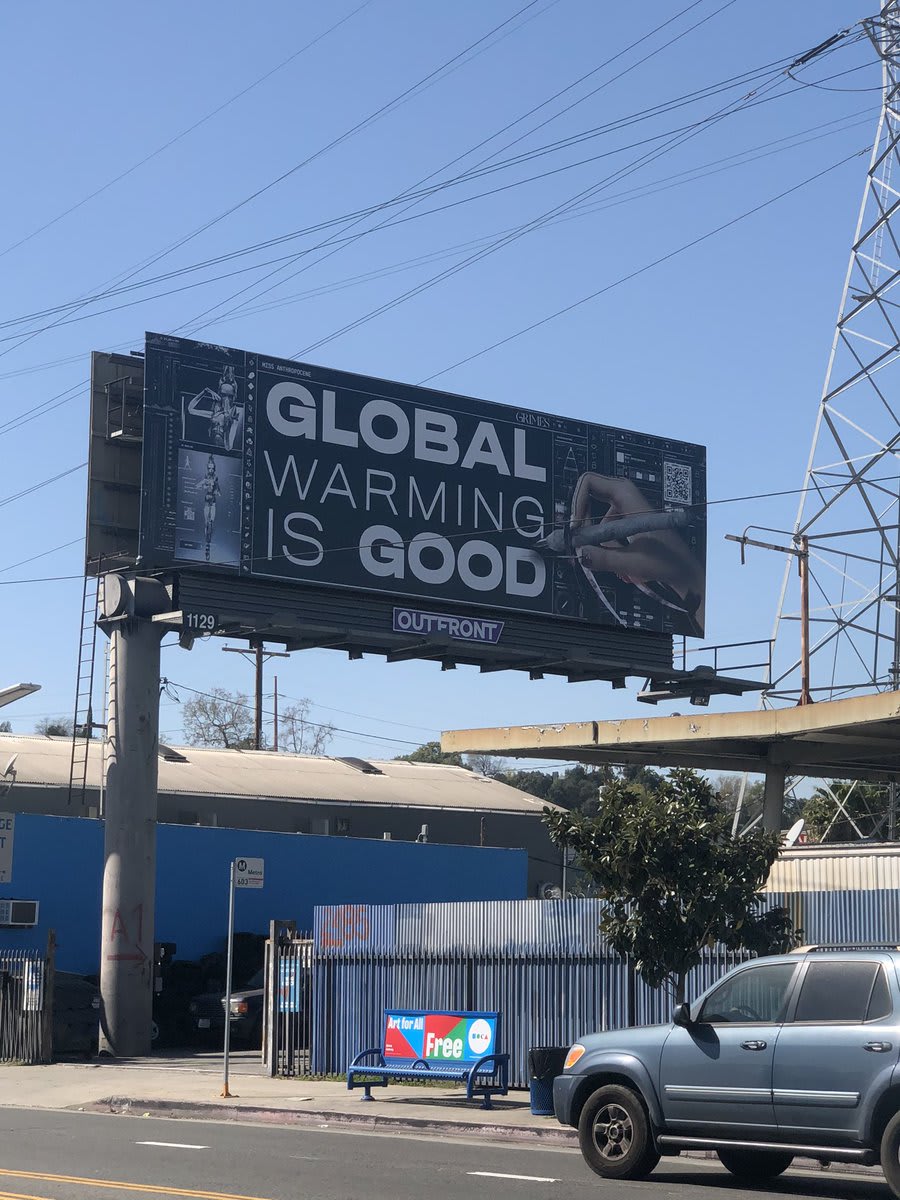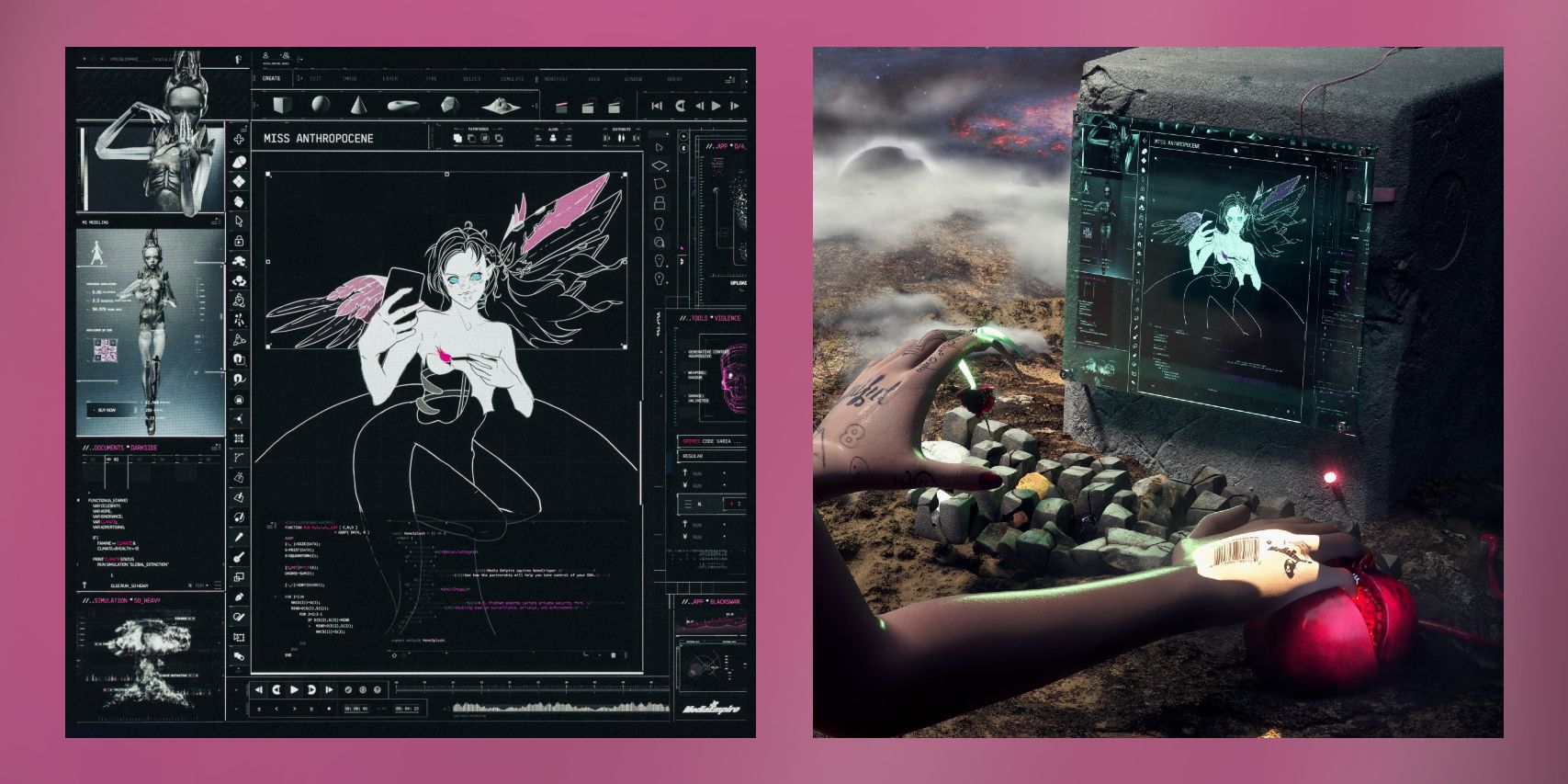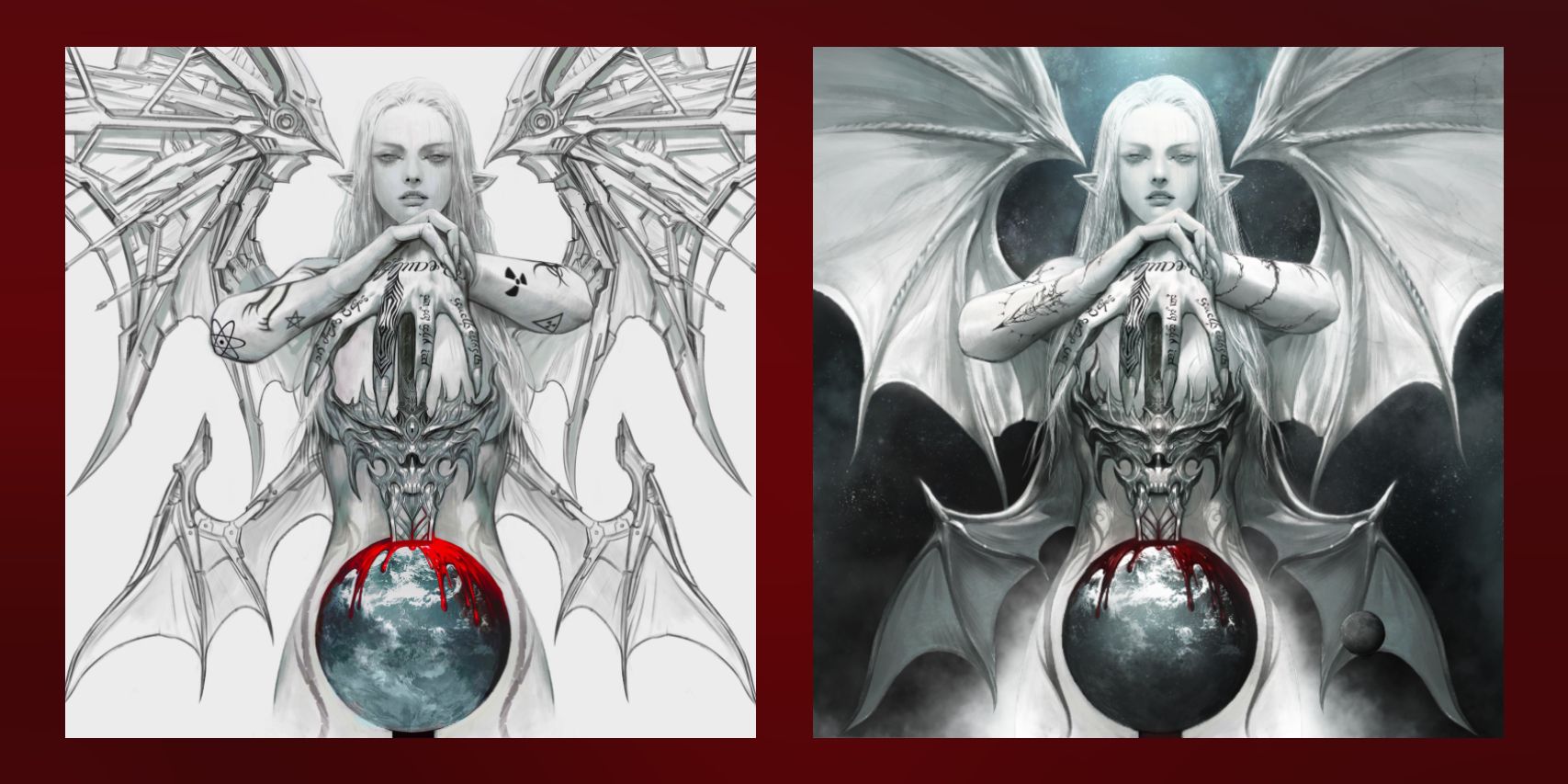This is the sound of the end of the world
revisiting an album about society collapsing a year into our actual collapse

I spent the first week of March 2020 drafting a post about the new Grimes album. I had a lot of thoughts about it. The following week, my roommates would start to work from home while I panicked about the status of my job in hospitality. The week after that, that job went away. Somewhere in there, I stopped writing about Grimes.
I didn’t stop listening to the album, though. Lyrics like “we don’t move our bodies anymore” and “you’re gonna get sick, you don’t know when” took on new, worse meanings. It was the sense of dread that I really identified with.

Miss Anthropocene is an album about the end of the world, though Grimes didn’t have a pandemic in mind when she wrote it. Her original description of its theme was met with plenty of ridicule online. “It’s a concept album about the anthropomorphic Goddess of climate Change: A psychedelic, space-dwelling demon/ beauty-Queen who relishes the end of the world,” she wrote in a since-deleted Instagram post. She concluded her description by saying:
Climate change is something I’m only ever confronted with in a sad/ guilty way…. Reading news and what not… so my goal is to make climate change fun (lol..??)…. uhhh… (I mean, everybody loves a good villain… re: the joker, Queen Beryl).. so maybe it’ll be a bit easier to look at if it can exist as a character and not just abstract doom.
Her “make climate change fun” line was taken out of context in multiple write-ups of the album, but any long-suffering Grimes fan knows that you can’t try to literally interpret anything that she says about her music. She once described her magnum opus, “Kill V. Maim,” as being “written from the perspective of Al Pacino in The Godfather Part 2, except he’s a vampire who can switch gender and travel through space.” You don’t need to know that to get “Kill V. Maim.” In fact, it’s probably better to not know that. Claire was watching The Godfather movies and it occurred to her that a gangster movie with vampires would be insane, and she made a song that could soundtrack this imaginary genre. But none of that matters! A weird idea led her to make “Kill V. Maim,” the song that would wake me from a coma. And the only thing you can really process when you’re listening to it is how hard it slaps.
Regardless of whether any of their concepts came through, the songs on Art Angels were bangers. So I expected anthems from Miss Anthropocene, rallying cries that would inspire us all to fight the destruction of our planet like we were superpowered vampire mafiosos.
Grimes is not the only musician to tackle the horror of global warming in her music, of course. NPR’s deep dive on the topic includes a mention of Smash Mouth’s “All Star,” which, lest you forget, told us that “judging by the hole in the satellite picture / the ice we skate is getting pretty thin / the water’s getting warm, so you might as well swim” back in 1999. Both the Verge and the Grist called 2019 the year of the climate crisis in pop music for the number of big acts, citing lyrics from Billie Eilish, Lana Del Rey, and (sigh) Lil Dicky. Grimes had suggested as early as 2017 that her new music would be coming “soon,” but five years of label disputes and false starts ultimately separated 2015’s Art Angels and Miss Anthropocene. In that time, a teenager essentially nailed her concept in one song.
Grimes had envisioned writing from the perspective of a goddess of climate change, in the vein of Mars, the Roman god of War, or other “Godly personifications of abstract/ horrific concepts.” Billie Eilish’s “all the good girls go to hell” anthropomorphizes the climate crisis similarly, as a dialogue between deities: God and Lucifer asking each other how humans had fucked up their world so badly. It’s a catchy pop song with a beat that draws you in and lyrics that catch your attention, especially when Billie switches from singing to speaking in the middle of the line “Man is such a fool, why are we saving him?” And it’s a rallying cry, too. Her video for the song contains the following caption:
A note from Billie: right now there are millions of people all over the world begging our leaders to pay attention. our earth is warming up at an unprecedented rate, icecaps are melting, our oceans are rising, our wildlife is being poisoned and our forests are burning. on september 23rd, the UN will host the 2019 Climate Action Summit to discuss how to tackle these issues. the clock is ticking. on friday september 20th and friday september 27th you can make your voice be heard. take it to the streets. #climatestrike https://globalclimatestrike.net
Of course Gen Z could capture despair better than a millennial. We merely adopted the dark; they were born in it. Billie’s effortlessly cool execution of the concept makes Grimes’ marketing attempts look even cornier in comparison:
And yet, for as heavy-handed and cringey as that billboard is, the songs on Miss Anthropocene have as much to do with global warming as “Kill V. Maim” does with Al Pacino. You can strain your ears and re-read the lyrics, but it’s impossible to find the connection. The concept was lost in execution. That’s a good thing in the case of “Kill V. Maim,” as the final product is lightyears better than the inspiration. It’s not as effective for Miss Anthropocene. An entire concept album should not obscure the concept beyond detection, particularly if the point of the concept was to convey an explicit message to the masses.
Perhaps Grimes was hesitant to embrace a pop sound after Art Angels, which she described as “a piece of crap” and “a stain on [her] life” after its massive success. But the result was the opposite of “making climate change fun.” Sure, the sense of dread is appropriate, but I already feel dread about climate change! Constantly! She described the sound of the album, which introduced industrial influences to her synthpop palette, as “ethereal nu-metal.” The result is heavy and alienating. Fellow millennial Rina Sawayama, on the other hand, has blended nu-metal with Y2K bubblegum in a way that is genuinely fun, even on songs like “XS” that critique capitalism.
I spent this week last year puzzling over where the album had gone wrong, but it turns out that none of that really mattered. The long-delayed Miss Anthopocene was released just in time for me to really need it. As a warning of the apocalypse, it failed. As a soundtrack to one, it was perfect.
We’re coming up on a year of quarantine — at least those of us who chose to abstain from travel and indoor dining are. I kept a daily quarantine diary until about August, when I realized that this was just life now and not some special circumstance I needed to document. I started to re-read my diary entries from March and April of 2020, but it was too painful to try to relive those days. “Grandpa called and we talked for about an hour, which was nice,” I wrote on March 30, unaware that I would be by his side in a hospital months later in head-to-toe PPE, wishing that he could see my face but knowing we were just a few yards away from the covid wing. “It’s so fucking apocalyptic. The sirens are nonstop,” I wrote on April 2, not knowing that at the beginning of 2021, the weekly death toll would be even higher than it was back then.
My roommates both went home at the beginning of the pandemic, and I was alone in the apartment for months. I remember the surreal numbness and isolation when I listen to Miss Anthropocene. The cover of the deluxe edition reminds me of that time, the colors burned into my brain from the number of times I pulled up the album on my desktop or phone. (I’ll confess that I didn’t stream either version on Spotify, exactly. I made a playlist to consolidate the confusing mess of remixes and versions that Grimes released. The songs labeled “Algorithm Mix” are shorter, without the interminable intros and outros from the “Art Mixes.” This is presumably to ensure that listeners play the song for at least 30 seconds, a requirement for a payout from Spotify. Like she won’t be getting child support from Elon Musk for the next 18 years!)
Grimes, in her infinite tinkering, has since decided that I shouldn’t like that album art. She changed it on all streaming platforms to some Deviant Art shit.

Miss Anthropocene is an album I like in spite of its artist, who seems determined to find reasons for me to stop liking her and her art. But once music is out in the world, it stops belonging to its creator. As much control as Grimes seems to want, she can’t change the fact that I’m attached to the original artwork for this album or that its meaning for me is completely separate from the message she intended to convey with it. It was the comforting hum that I listened to when it felt like everything was falling apart, its drone of despair grounding the emotions that had overtaken me.
Oddly, now, I miss those months. The world is now hurtling forward, with businesses and schools open like normal, a Super Bowl and Halftime Show with fans in the seats, a new president promising a return to normalcy, and no time to process what has happened and continues to happen to us. I want an acknowledgement of the dread. I listen to those songs and I remember that time. I lived through it. It was real. I suspect that we’ll all have our own talismans to reminds us for years to come. You’ll put on an album or pull out a recipe or rewatch a show, and it will come back to you.
We lived through it. It hurt us in ways we haven’t begun to understand. It was real.
More like this:
“Return of Saturn still rules, 20 years later”
